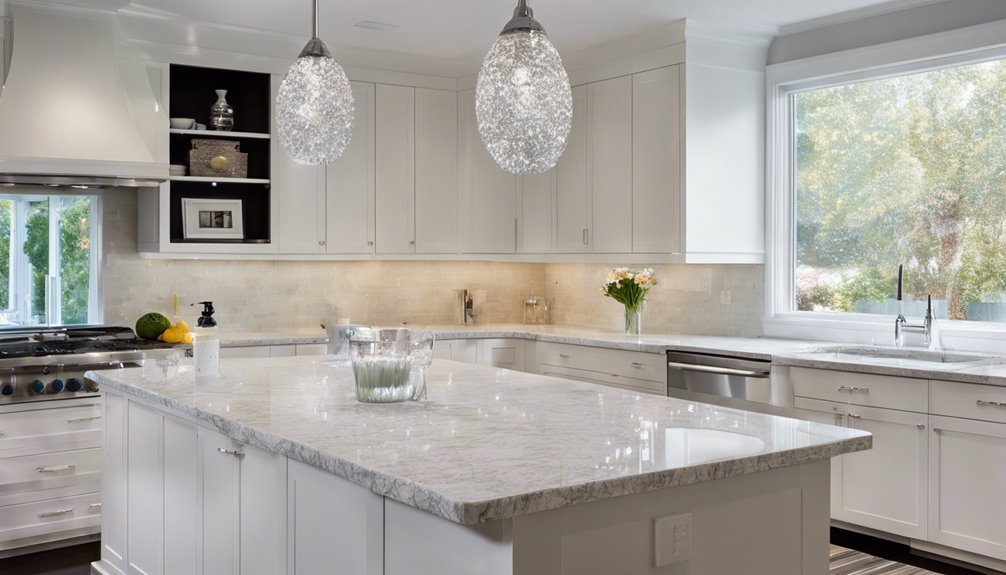What Capacity Water Softner Do I Need?
When you're trying to figure out what capacity water softener you need, it's important to take into account both your household size and daily water usage. You might be surprised to learn that the hardness level of your water also plays a significant role in this decision. By calculating your household's total water consumption and understanding your water's hardness, you'll be better equipped to choose a softener that meets your needs. But what happens if you choose a unit that's too small or too large? Let's explore the implications further.
Key Takeaways
- Determine your household's daily water usage, typically estimated at 80-100 gallons per person, to assess overall consumption needs.
- Measure your water hardness level in grains per gallon to understand how much capacity your softener must handle.
- Calculate the total grain capacity needed by multiplying daily water usage by water hardness level and considering your household size.
- Choose a water softener with a grain capacity that exceeds your calculated needs to ensure efficiency and reduce regeneration frequency.
- Consider additional factors like household size, budget, and water conditions to select the most suitable softener for your needs.
Understanding Water Hardness
Water hardness refers to the concentration of dissolved minerals, primarily calcium and magnesium, in your water supply. These minerals impact your water quality greatly.
When the hardness levels are high, you might notice various hardness effects, such as scale buildup in pipes, appliances, and fixtures. This can lead to reduced efficiency and increased energy costs as your water heaters and dishwashers work harder.
Hard water can also affect your skin and hair. You may find that soaps and shampoos don't lather as well, leading to a feeling of residue after washing.
Furthermore, your laundry mightn't come out as clean or feel as soft, necessitating more detergent and potentially harming your fabrics over time.
In terms of health, while hard water isn't typically harmful, it can affect the taste and palatability of the water you drink. The mineral content can alter flavor profiles, making your water less enjoyable.
Understanding these aspects of water hardness is vital for determining whether a water softener is necessary for your home, as it can greatly improve your overall water quality and mitigate the negative effects associated with hard water.
Daily Water Usage Calculation
To accurately calculate your daily water usage, start by estimating the size of your household, as this directly impacts consumption.
Next, consider the specific usage of appliances like dishwashers and washing machines, which can greatly contribute to your total water needs.
Finally, factor in the hardness levels of your water, as this will influence how much softened water your household requires.
Estimate Household Size
When estimating household size for daily water usage calculations, it's crucial to take into account various factors that influence consumption patterns.
Start by analyzing your household demographics, including the number of residents and their age groups. Children, adults, and seniors often have different water usage needs, which can impact your overall consumption.
Next, consider your family lifestyle. For instance, larger families tend to use more water than smaller ones, not just for drinking but also for bathing, cooking, and laundry.
Think about how often you engage in activities that consume significant amounts of water, like showering or running the dishwasher.
You should also factor in any unique habits or preferences, such as gardening or frequent laundry loads, which can considerably affect daily usage.
To get a more accurate estimate, you could track your water usage over a week or month, noting any spikes during specific activities.
Consider Appliance Usage
Appliance usage greatly contributes to your household's daily water consumption and should be factored into your overall calculations. To determine the appropriate capacity for your water softener, you'll want to analyze the water usage of various appliances. Each appliance varies in efficiency and usage patterns, impacting your total daily water consumption.
Here's a table to help you estimate your daily water usage from common household appliances:
| Appliance | Daily Usage (Gallons) | Efficiency Rating |
|---|---|---|
| Washing Machine | 15 | High |
| Dishwasher | 6 | Medium |
| Shower | 12 | High |
| Toilet | 20 | Low |
| Kitchen Faucet | 5 | Medium |
Factor in Hardness Levels
Understanding water hardness levels is essential for accurately calculating your daily water usage and determining the right capacity for your water softener. Knowing the hardness of your water helps you gauge how much mineral content, particularly calcium and magnesium, is present. This information directly influences the efficiency and effectiveness of your water softening system.
- Regular hardness testing guarantees you know the specific levels in your water.
- Higher mineral content means your softener will need to work harder.
- Accurate daily water usage calculations can prevent overworking your system.
- Understanding hardness levels can help you select the right salt type.
- Proper maintenance schedules can be established based on hardness data.
To calculate your daily water usage, multiply the number of people in your household by the average water consumption per person (typically around 80-100 gallons per day).
Then, factor in the water's hardness level. For every grain of hardness per gallon, your softener will need to remove a specific amount of minerals.
This calculation guarantees you select a water softener with the right capacity, providing long-term efficiency and cost savings.
Household Size Consideration
In considering the capacity of a water softener, household size plays an important role in determining the right system for your needs. The number of people living in your home directly influences your water consumption and, consequently, the softener's capacity. If you have a larger family, you'll likely use more water daily, especially during peak times like morning showers or laundry days.
Understanding your household habits is vital here. For instance, if you frequently run multiple appliances simultaneously—like a dishwasher while doing laundry—your softener will need to handle a higher demand.
Moreover, family dynamics, such as whether you have young children or teenagers, can affect water usage patterns. Teenagers may take longer showers or use more water for activities, which can increase your softening needs.
To accurately assess your requirements, consider both your household size and individual usage habits. By analyzing these factors, you can select a water softener that efficiently meets your needs, ensuring you maintain the best water quality without the hassle of frequent regenerations or downtime.
This approach helps you avoid potential issues related to insufficient capacity in your water softening system.
Softener Capacity Ratings
When selecting a water softener, understanding its grain capacity is essential for meeting your household's needs.
You'll need to take into account both your household size and the hardness level of your water to determine the right system for your situation.
Accurately measuring water hardness will help you optimize softener performance and guarantee efficient operation.
Understanding Grain Capacity
Grain capacity ratings play a crucial role in selecting the right water softener for your home, as these ratings indicate how much hardness the system can effectively handle before needing to regenerate. Understanding grain capacity is fundamental to guarantee your softener operates at peak efficiency.
- Grain capacity measures the total hardness (in grains) a softener can remove.
- A higher grain capacity means the system can handle more hardness without frequent regeneration.
- Softener efficiency refers to how well a system can remove hardness while minimizing salt and water usage.
- Choosing the right grain capacity helps avoid premature system failure or inefficiencies.
- Knowing your water hardness level aids in selecting a softener that matches your needs.
When evaluating grain capacity, consider the hardness of your water supply and how often you'll need to regenerate the system.
Selecting a softener with the appropriate grain capacity guarantees that you're getting the most out of your investment, maintaining the longevity of your unit, and saving on maintenance costs.
Ultimately, understanding these ratings gives you the knowledge to make an informed decision, leading to better water quality and increased softener efficiency in your home.
Household Size Considerations
Choosing the right water softener capacity often hinges on the size of your household. Understanding your family size is essential because it directly impacts your water usage. Larger families typically consume more water, requiring a higher capacity softener to effectively manage hardness levels.
To determine the appropriate capacity, start by calculating your household's daily water usage. On average, each person uses about 80-100 gallons of water daily. Multiply this figure by your family size to estimate total consumption. For example, a family of four might use around 320-400 gallons per day.
Next, consider the hardness of your incoming water, usually measured in grains per gallon. This measurement, combined with your total water usage, helps you select a softener that can regenerate efficiently and meet your needs without running out of capacity.
When you know your household size and daily water usage, you can choose a water softener that maintains peak performance.
Water Hardness Measurement
Understanding water hardness measurement is essential for selecting a suitable water softener capacity that effectively addresses your home's needs. Water hardness is typically measured in grains per gallon (gpg) or parts per million (ppm). In order to determine your home's water hardness, you'll need to perform water testing, which provides the necessary data for accurate assessment.
Here are some key points to take into account:
- Hardness Scale: Water hardness is categorized into soft, moderately hard, hard, and very hard.
- Testing Methods: You can use test strips or a water testing kit to gauge hardness levels accurately.
- Impact on Appliances: High hardness levels can lead to scale buildup in pipes and appliances, affecting efficiency.
- Water Softener Efficiency: Knowing your water hardness helps in selecting a softener with the right capacity to handle your specific needs.
- Regular Testing: Periodic water testing is recommended to monitor changes in hardness over time.
Once you understand your water's hardness scale, you can confidently choose a water softener that will maintain ideal performance and protect your home from the adverse effects of hard water.
Types of Water Softeners
When it comes to water softeners, you'll find several types designed to cater to different needs and preferences. One of the most common types is the salt-based system, which utilizes sodium ions to replace hardness-causing minerals like calcium and magnesium in your water. This method is highly effective in reducing scale buildup and improving the quality of your water supply.
Another option you might consider is a dual tank system. These units come equipped with two resin tanks, allowing for uninterrupted softening. While one tank is in use, the other regenerates, ensuring you always have access to softened water, even during peak demand times. This is particularly beneficial for larger households or commercial applications where water usage is high.
You may also encounter salt-free systems, which use a different technology, such as template-assisted crystallization, to prevent scale without removing minerals. While these systems are excellent for maintenance, they may not be as effective in extremely hard water situations.
Additional Factors to Consider
In addition to the type of water softener you select, several important factors can influence its effectiveness and suitability for your needs. Understanding these elements can help guarantee you make a well-informed decision that balances performance and cost.
- Household size: Larger families may require a more robust system.
- Water hardness level: Evaluating your water's hardness will determine the necessary capacity.
- Regeneration frequency: The time between regenerations can impact system efficiency and salt usage.
- Water usage patterns: Daily water consumption affects how quickly your softener works.
- Budget constraints: Conducting a cost analysis helps identify the best options within your financial means.
Each of these factors plays a pivotal role in how well your water softener meets your demands. A thorough cost analysis will help you understand not only the initial investment but also the long-term operational costs.
Prioritizing system efficiency guarantees you're not just buying a unit that works but one that optimizes water usage and salt consumption, ultimately saving you money over time. By considering these additional factors, you can achieve the right balance between performance, efficiency, and cost.
Installation and Maintenance Tips
Proper installation and ongoing maintenance are vital for maximizing the efficiency and lifespan of your water softener. During the installation process, verify you've chosen a location that's accessible and has a drainage point. Follow the manufacturer's instructions closely, paying attention to inlet and outlet connections. If you're uncertain, consider hiring a professional to avoid costly mistakes.
Creating a maintenance schedule is important. Regularly check the salt levels in the brine tank and refill as needed. You should also inspect the resin beads for clogs or degradation. Below is a simple table to help you track your installation and maintenance tasks:
| Task | Frequency |
|---|---|
| Check salt levels | Monthly |
| Inspect resin beads | Every 6 months |
| Clean the brine tank | Annually |
Choosing the Right Brand
Selecting the right brand of water softener can greatly impact your home's water quality and system efficiency. With numerous options available, it's crucial to conduct a thorough brand comparison to find the best fit for your needs.
Consider the following factors:
- Efficiency ratings and salt usage
- Warranty and customer support offered
- Price range and value for money
- Installation complexity and requirements
- Customer reviews and testimonials
When evaluating brands, look for those with a solid reputation backed by positive customer reviews. These insights can provide you with firsthand experiences regarding performance, reliability, and service.
It's also worth checking for any industry certifications, as they can indicate product quality and adherence to standards.
Don't forget to compare features across different brands. Some may offer advanced technology like smart controls or dual-tank systems, which can enhance efficiency and convenience.
Ultimately, choosing a reputable brand with a proven track record will guarantee you invest in a water softener that not only meets your capacity needs but also delivers long-lasting performance and satisfaction.
Frequently Asked Questions
Can I Install a Water Softener Myself?
Yes, you can install a water softener yourself. With the right DIY installation skills and water softener tools, you'll save money. Just make sure you follow the manufacturer's instructions carefully for a successful installation.
How Long Does a Water Softener Last?
A typical water softener lifespan ranges from 10 to 15 years. To extend its durability, follow maintenance tips like regular salt replenishment, cleaning resin beads, and checking for leaks to guarantee peak performance throughout its life.
What Are the Signs I Need a Water Softener?
If you notice white scale buildup on your faucets, you're likely experiencing hard water symptoms. Poor water quality can lead to dry skin and dull hair too. Consider a water softener to combat these issues effectively.
Is There a Difference Between Salt-Free and Traditional Softeners?
Yes, there's a difference. Salt-free systems offer benefits like reducing scale buildup without adding sodium, while traditional softeners have drawbacks, including increased salt use and potential environmental concerns. Choose based on your needs and preferences.
How Often Should I Regenerate My Water Softener?
So, you think your softener's on vacation? It's not! Regeneration frequency should be based on your water usage; typically, every 7-14 days guarantees peak softener efficiency. Don't let hard water crash the party!
Conclusion
In summary, choosing the right water softener is essential for your home's comfort and efficiency. By understanding your water hardness, calculating daily usage, and considering household size, you can guarantee peak performance. Invest in a system that meets your needs, maintain it regularly for longevity, and enjoy the benefits of softened water—better appliances, cleaner dishes, and healthier skin. Don't settle for less; make the right choice today and experience the difference tomorrow.







